Psychiatric Diagnostic Systems and Patient Outcomes: MENT3000 Essay
VerifiedAdded on 2022/11/22
|7
|2180
|425
Essay
AI Summary
This essay critically examines the impact of psychiatric diagnostic classification systems, specifically the DSM-V and ICD, on patient outcomes. It argues that these systems may lead to suboptimal outcomes due to over-diagnosis, medicalization of normal human reactions, and the limitations of the biomedical model. The essay discusses the validity of the DSM-V and ICD, highlighting critiques related to the medicalization of everyday life, overlapping symptoms, and the exclusion of social contexts. It explores the perspectives of various researchers and experts, including the challenges of the biomedical model and the importance of considering individual socio-economic factors in mental health diagnosis and treatment. The essay concludes by emphasizing the need for evidence-based practices and person-centered care plans to improve mental health outcomes and mitigate the potential negative effects of psychiatric labels.
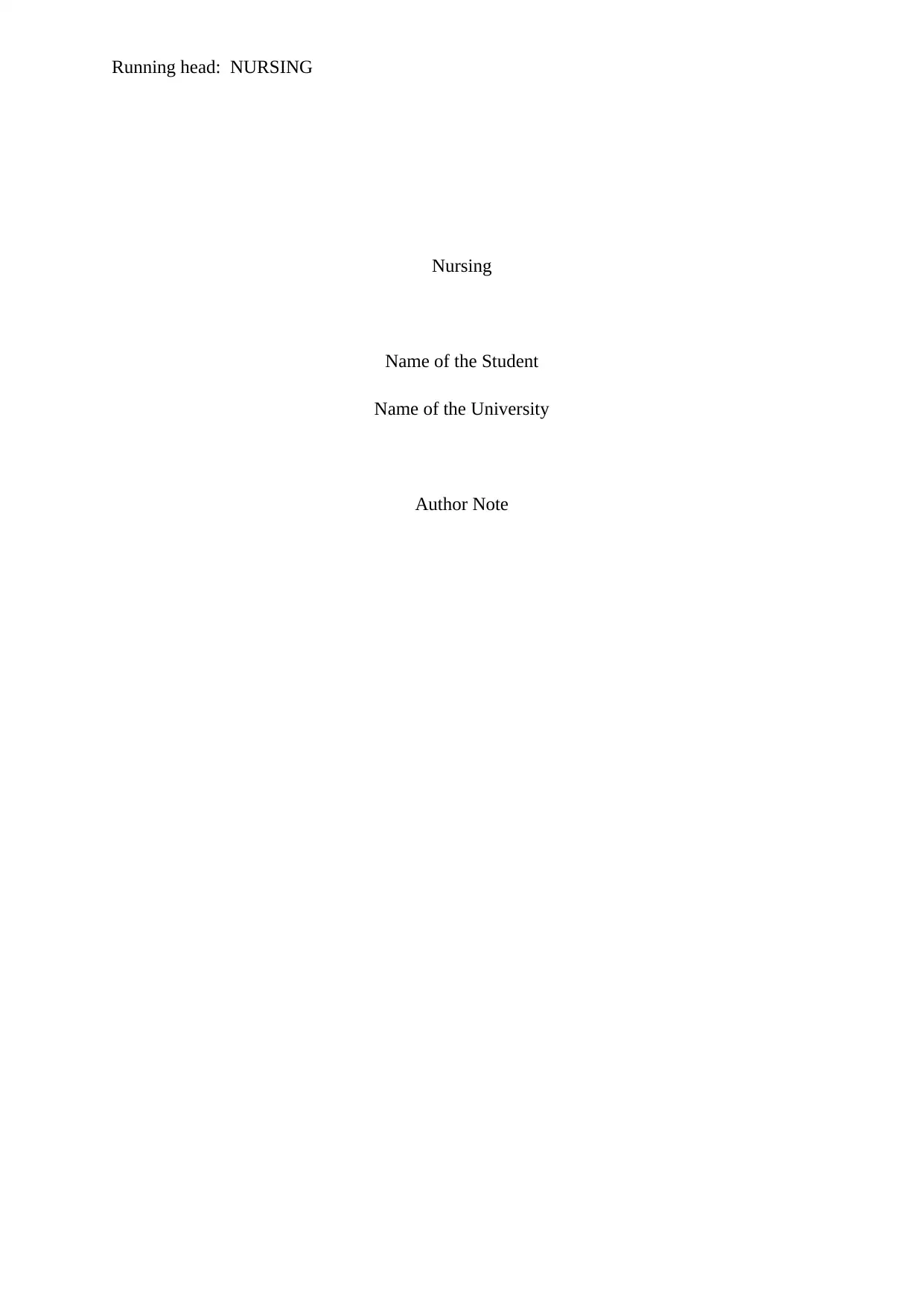
Running head: NURSING
Nursing
Name of the Student
Name of the University
Author Note
Nursing
Name of the Student
Name of the University
Author Note
Paraphrase This Document
Need a fresh take? Get an instant paraphrase of this document with our AI Paraphraser
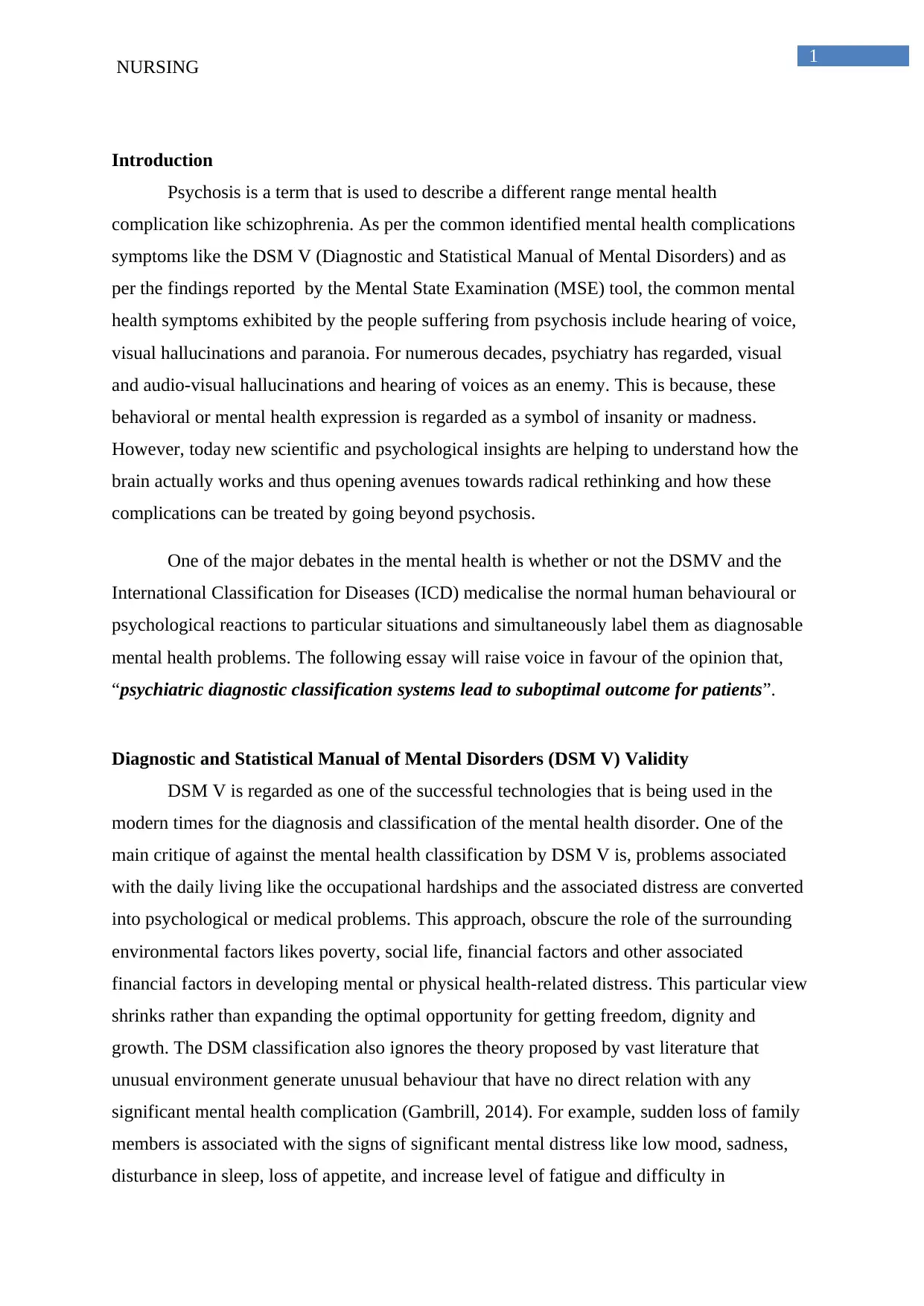
1
NURSING
Introduction
Psychosis is a term that is used to describe a different range mental health
complication like schizophrenia. As per the common identified mental health complications
symptoms like the DSM V (Diagnostic and Statistical Manual of Mental Disorders) and as
per the findings reported by the Mental State Examination (MSE) tool, the common mental
health symptoms exhibited by the people suffering from psychosis include hearing of voice,
visual hallucinations and paranoia. For numerous decades, psychiatry has regarded, visual
and audio-visual hallucinations and hearing of voices as an enemy. This is because, these
behavioral or mental health expression is regarded as a symbol of insanity or madness.
However, today new scientific and psychological insights are helping to understand how the
brain actually works and thus opening avenues towards radical rethinking and how these
complications can be treated by going beyond psychosis.
One of the major debates in the mental health is whether or not the DSMV and the
International Classification for Diseases (ICD) medicalise the normal human behavioural or
psychological reactions to particular situations and simultaneously label them as diagnosable
mental health problems. The following essay will raise voice in favour of the opinion that,
“psychiatric diagnostic classification systems lead to suboptimal outcome for patients”.
Diagnostic and Statistical Manual of Mental Disorders (DSM V) Validity
DSM V is regarded as one of the successful technologies that is being used in the
modern times for the diagnosis and classification of the mental health disorder. One of the
main critique of against the mental health classification by DSM V is, problems associated
with the daily living like the occupational hardships and the associated distress are converted
into psychological or medical problems. This approach, obscure the role of the surrounding
environmental factors likes poverty, social life, financial factors and other associated
financial factors in developing mental or physical health-related distress. This particular view
shrinks rather than expanding the optimal opportunity for getting freedom, dignity and
growth. The DSM classification also ignores the theory proposed by vast literature that
unusual environment generate unusual behaviour that have no direct relation with any
significant mental health complication (Gambrill, 2014). For example, sudden loss of family
members is associated with the signs of significant mental distress like low mood, sadness,
disturbance in sleep, loss of appetite, and increase level of fatigue and difficulty in
NURSING
Introduction
Psychosis is a term that is used to describe a different range mental health
complication like schizophrenia. As per the common identified mental health complications
symptoms like the DSM V (Diagnostic and Statistical Manual of Mental Disorders) and as
per the findings reported by the Mental State Examination (MSE) tool, the common mental
health symptoms exhibited by the people suffering from psychosis include hearing of voice,
visual hallucinations and paranoia. For numerous decades, psychiatry has regarded, visual
and audio-visual hallucinations and hearing of voices as an enemy. This is because, these
behavioral or mental health expression is regarded as a symbol of insanity or madness.
However, today new scientific and psychological insights are helping to understand how the
brain actually works and thus opening avenues towards radical rethinking and how these
complications can be treated by going beyond psychosis.
One of the major debates in the mental health is whether or not the DSMV and the
International Classification for Diseases (ICD) medicalise the normal human behavioural or
psychological reactions to particular situations and simultaneously label them as diagnosable
mental health problems. The following essay will raise voice in favour of the opinion that,
“psychiatric diagnostic classification systems lead to suboptimal outcome for patients”.
Diagnostic and Statistical Manual of Mental Disorders (DSM V) Validity
DSM V is regarded as one of the successful technologies that is being used in the
modern times for the diagnosis and classification of the mental health disorder. One of the
main critique of against the mental health classification by DSM V is, problems associated
with the daily living like the occupational hardships and the associated distress are converted
into psychological or medical problems. This approach, obscure the role of the surrounding
environmental factors likes poverty, social life, financial factors and other associated
financial factors in developing mental or physical health-related distress. This particular view
shrinks rather than expanding the optimal opportunity for getting freedom, dignity and
growth. The DSM classification also ignores the theory proposed by vast literature that
unusual environment generate unusual behaviour that have no direct relation with any
significant mental health complication (Gambrill, 2014). For example, sudden loss of family
members is associated with the signs of significant mental distress like low mood, sadness,
disturbance in sleep, loss of appetite, and increase level of fatigue and difficulty in
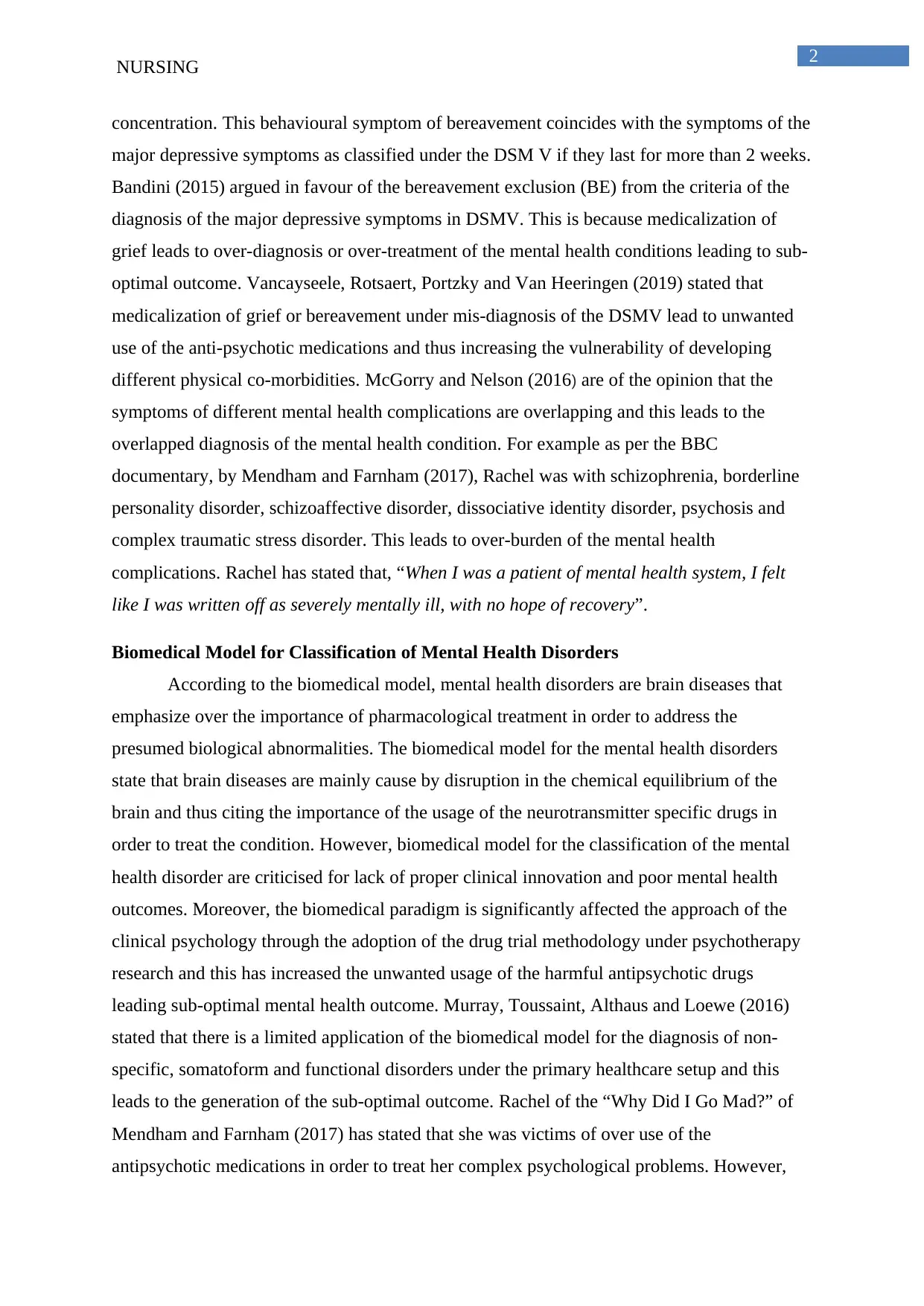
2
NURSING
concentration. This behavioural symptom of bereavement coincides with the symptoms of the
major depressive symptoms as classified under the DSM V if they last for more than 2 weeks.
Bandini (2015) argued in favour of the bereavement exclusion (BE) from the criteria of the
diagnosis of the major depressive symptoms in DSMV. This is because medicalization of
grief leads to over-diagnosis or over-treatment of the mental health conditions leading to sub-
optimal outcome. Vancayseele, Rotsaert, Portzky and Van Heeringen (2019) stated that
medicalization of grief or bereavement under mis-diagnosis of the DSMV lead to unwanted
use of the anti-psychotic medications and thus increasing the vulnerability of developing
different physical co-morbidities. McGorry and Nelson (2016) are of the opinion that the
symptoms of different mental health complications are overlapping and this leads to the
overlapped diagnosis of the mental health condition. For example as per the BBC
documentary, by Mendham and Farnham (2017), Rachel was with schizophrenia, borderline
personality disorder, schizoaffective disorder, dissociative identity disorder, psychosis and
complex traumatic stress disorder. This leads to over-burden of the mental health
complications. Rachel has stated that, “When I was a patient of mental health system, I felt
like I was written off as severely mentally ill, with no hope of recovery”.
Biomedical Model for Classification of Mental Health Disorders
According to the biomedical model, mental health disorders are brain diseases that
emphasize over the importance of pharmacological treatment in order to address the
presumed biological abnormalities. The biomedical model for the mental health disorders
state that brain diseases are mainly cause by disruption in the chemical equilibrium of the
brain and thus citing the importance of the usage of the neurotransmitter specific drugs in
order to treat the condition. However, biomedical model for the classification of the mental
health disorder are criticised for lack of proper clinical innovation and poor mental health
outcomes. Moreover, the biomedical paradigm is significantly affected the approach of the
clinical psychology through the adoption of the drug trial methodology under psychotherapy
research and this has increased the unwanted usage of the harmful antipsychotic drugs
leading sub-optimal mental health outcome. Murray, Toussaint, Althaus and Loewe (2016)
stated that there is a limited application of the biomedical model for the diagnosis of non-
specific, somatoform and functional disorders under the primary healthcare setup and this
leads to the generation of the sub-optimal outcome. Rachel of the “Why Did I Go Mad?” of
Mendham and Farnham (2017) has stated that she was victims of over use of the
antipsychotic medications in order to treat her complex psychological problems. However,
NURSING
concentration. This behavioural symptom of bereavement coincides with the symptoms of the
major depressive symptoms as classified under the DSM V if they last for more than 2 weeks.
Bandini (2015) argued in favour of the bereavement exclusion (BE) from the criteria of the
diagnosis of the major depressive symptoms in DSMV. This is because medicalization of
grief leads to over-diagnosis or over-treatment of the mental health conditions leading to sub-
optimal outcome. Vancayseele, Rotsaert, Portzky and Van Heeringen (2019) stated that
medicalization of grief or bereavement under mis-diagnosis of the DSMV lead to unwanted
use of the anti-psychotic medications and thus increasing the vulnerability of developing
different physical co-morbidities. McGorry and Nelson (2016) are of the opinion that the
symptoms of different mental health complications are overlapping and this leads to the
overlapped diagnosis of the mental health condition. For example as per the BBC
documentary, by Mendham and Farnham (2017), Rachel was with schizophrenia, borderline
personality disorder, schizoaffective disorder, dissociative identity disorder, psychosis and
complex traumatic stress disorder. This leads to over-burden of the mental health
complications. Rachel has stated that, “When I was a patient of mental health system, I felt
like I was written off as severely mentally ill, with no hope of recovery”.
Biomedical Model for Classification of Mental Health Disorders
According to the biomedical model, mental health disorders are brain diseases that
emphasize over the importance of pharmacological treatment in order to address the
presumed biological abnormalities. The biomedical model for the mental health disorders
state that brain diseases are mainly cause by disruption in the chemical equilibrium of the
brain and thus citing the importance of the usage of the neurotransmitter specific drugs in
order to treat the condition. However, biomedical model for the classification of the mental
health disorder are criticised for lack of proper clinical innovation and poor mental health
outcomes. Moreover, the biomedical paradigm is significantly affected the approach of the
clinical psychology through the adoption of the drug trial methodology under psychotherapy
research and this has increased the unwanted usage of the harmful antipsychotic drugs
leading sub-optimal mental health outcome. Murray, Toussaint, Althaus and Loewe (2016)
stated that there is a limited application of the biomedical model for the diagnosis of non-
specific, somatoform and functional disorders under the primary healthcare setup and this
leads to the generation of the sub-optimal outcome. Rachel of the “Why Did I Go Mad?” of
Mendham and Farnham (2017) has stated that she was victims of over use of the
antipsychotic medications in order to treat her complex psychological problems. However,
⊘ This is a preview!⊘
Do you want full access?
Subscribe today to unlock all pages.

Trusted by 1+ million students worldwide
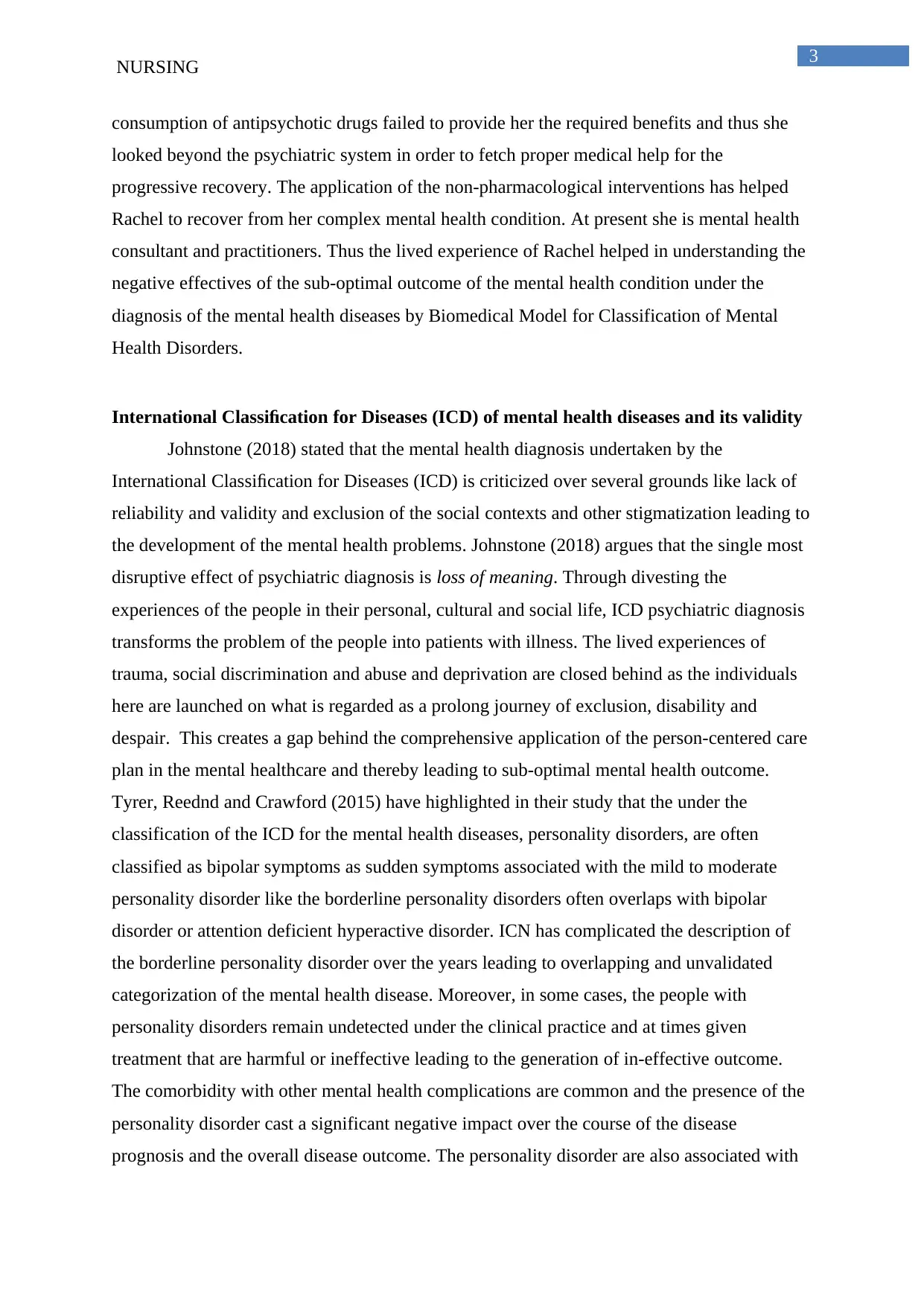
3
NURSING
consumption of antipsychotic drugs failed to provide her the required benefits and thus she
looked beyond the psychiatric system in order to fetch proper medical help for the
progressive recovery. The application of the non-pharmacological interventions has helped
Rachel to recover from her complex mental health condition. At present she is mental health
consultant and practitioners. Thus the lived experience of Rachel helped in understanding the
negative effectives of the sub-optimal outcome of the mental health condition under the
diagnosis of the mental health diseases by Biomedical Model for Classification of Mental
Health Disorders.
International Classification for Diseases (ICD) of mental health diseases and its validity
Johnstone (2018) stated that the mental health diagnosis undertaken by the
International Classification for Diseases (ICD) is criticized over several grounds like lack of
reliability and validity and exclusion of the social contexts and other stigmatization leading to
the development of the mental health problems. Johnstone (2018) argues that the single most
disruptive effect of psychiatric diagnosis is loss of meaning. Through divesting the
experiences of the people in their personal, cultural and social life, ICD psychiatric diagnosis
transforms the problem of the people into patients with illness. The lived experiences of
trauma, social discrimination and abuse and deprivation are closed behind as the individuals
here are launched on what is regarded as a prolong journey of exclusion, disability and
despair. This creates a gap behind the comprehensive application of the person-centered care
plan in the mental healthcare and thereby leading to sub-optimal mental health outcome.
Tyrer, Reednd and Crawford (2015) have highlighted in their study that the under the
classification of the ICD for the mental health diseases, personality disorders, are often
classified as bipolar symptoms as sudden symptoms associated with the mild to moderate
personality disorder like the borderline personality disorders often overlaps with bipolar
disorder or attention deficient hyperactive disorder. ICN has complicated the description of
the borderline personality disorder over the years leading to overlapping and unvalidated
categorization of the mental health disease. Moreover, in some cases, the people with
personality disorders remain undetected under the clinical practice and at times given
treatment that are harmful or ineffective leading to the generation of in-effective outcome.
The comorbidity with other mental health complications are common and the presence of the
personality disorder cast a significant negative impact over the course of the disease
prognosis and the overall disease outcome. The personality disorder are also associated with
NURSING
consumption of antipsychotic drugs failed to provide her the required benefits and thus she
looked beyond the psychiatric system in order to fetch proper medical help for the
progressive recovery. The application of the non-pharmacological interventions has helped
Rachel to recover from her complex mental health condition. At present she is mental health
consultant and practitioners. Thus the lived experience of Rachel helped in understanding the
negative effectives of the sub-optimal outcome of the mental health condition under the
diagnosis of the mental health diseases by Biomedical Model for Classification of Mental
Health Disorders.
International Classification for Diseases (ICD) of mental health diseases and its validity
Johnstone (2018) stated that the mental health diagnosis undertaken by the
International Classification for Diseases (ICD) is criticized over several grounds like lack of
reliability and validity and exclusion of the social contexts and other stigmatization leading to
the development of the mental health problems. Johnstone (2018) argues that the single most
disruptive effect of psychiatric diagnosis is loss of meaning. Through divesting the
experiences of the people in their personal, cultural and social life, ICD psychiatric diagnosis
transforms the problem of the people into patients with illness. The lived experiences of
trauma, social discrimination and abuse and deprivation are closed behind as the individuals
here are launched on what is regarded as a prolong journey of exclusion, disability and
despair. This creates a gap behind the comprehensive application of the person-centered care
plan in the mental healthcare and thereby leading to sub-optimal mental health outcome.
Tyrer, Reednd and Crawford (2015) have highlighted in their study that the under the
classification of the ICD for the mental health diseases, personality disorders, are often
classified as bipolar symptoms as sudden symptoms associated with the mild to moderate
personality disorder like the borderline personality disorders often overlaps with bipolar
disorder or attention deficient hyperactive disorder. ICN has complicated the description of
the borderline personality disorder over the years leading to overlapping and unvalidated
categorization of the mental health disease. Moreover, in some cases, the people with
personality disorders remain undetected under the clinical practice and at times given
treatment that are harmful or ineffective leading to the generation of in-effective outcome.
The comorbidity with other mental health complications are common and the presence of the
personality disorder cast a significant negative impact over the course of the disease
prognosis and the overall disease outcome. The personality disorder are also associated with
Paraphrase This Document
Need a fresh take? Get an instant paraphrase of this document with our AI Paraphraser
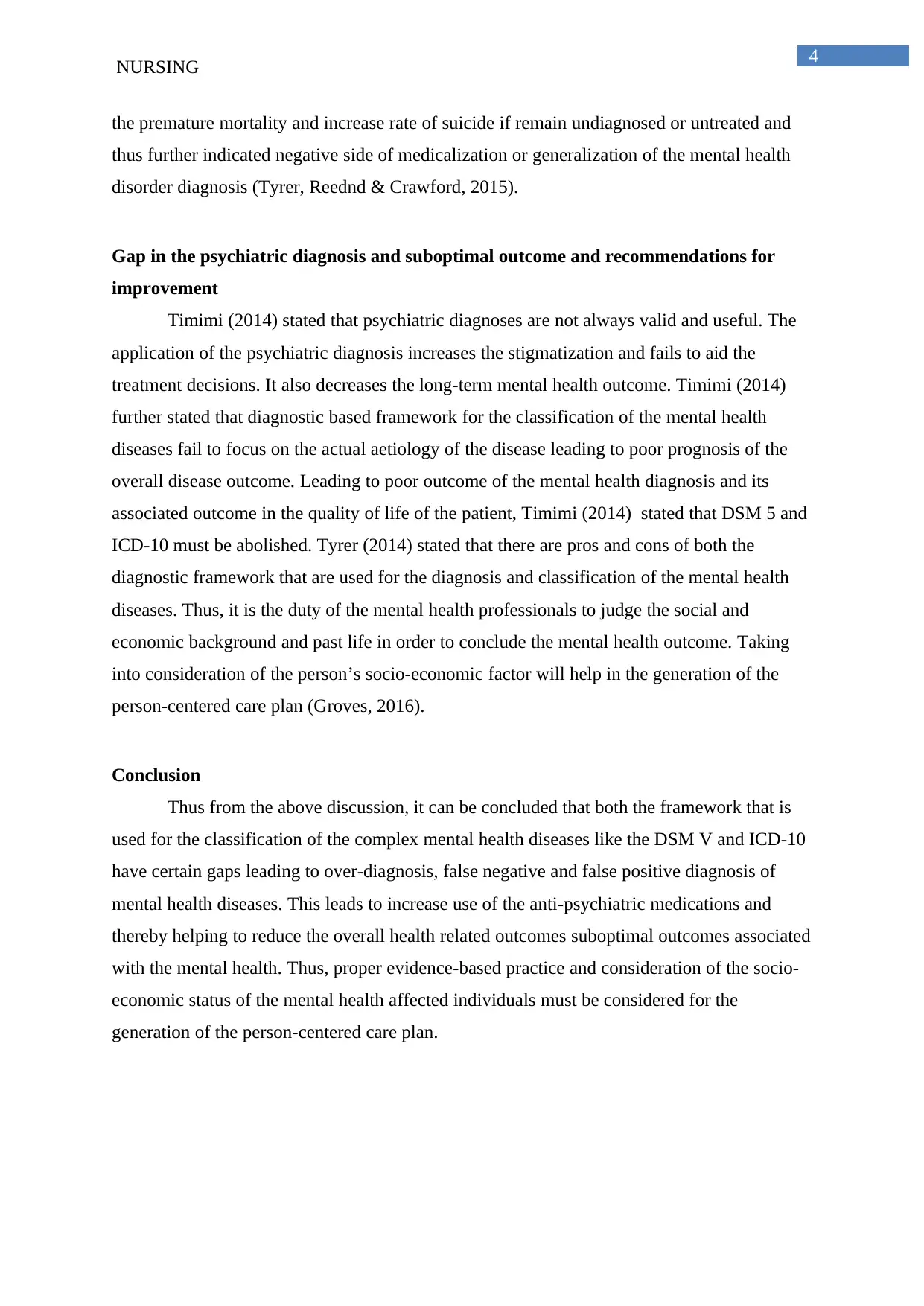
4
NURSING
the premature mortality and increase rate of suicide if remain undiagnosed or untreated and
thus further indicated negative side of medicalization or generalization of the mental health
disorder diagnosis (Tyrer, Reednd & Crawford, 2015).
Gap in the psychiatric diagnosis and suboptimal outcome and recommendations for
improvement
Timimi (2014) stated that psychiatric diagnoses are not always valid and useful. The
application of the psychiatric diagnosis increases the stigmatization and fails to aid the
treatment decisions. It also decreases the long-term mental health outcome. Timimi (2014)
further stated that diagnostic based framework for the classification of the mental health
diseases fail to focus on the actual aetiology of the disease leading to poor prognosis of the
overall disease outcome. Leading to poor outcome of the mental health diagnosis and its
associated outcome in the quality of life of the patient, Timimi (2014) stated that DSM 5 and
ICD-10 must be abolished. Tyrer (2014) stated that there are pros and cons of both the
diagnostic framework that are used for the diagnosis and classification of the mental health
diseases. Thus, it is the duty of the mental health professionals to judge the social and
economic background and past life in order to conclude the mental health outcome. Taking
into consideration of the person’s socio-economic factor will help in the generation of the
person-centered care plan (Groves, 2016).
Conclusion
Thus from the above discussion, it can be concluded that both the framework that is
used for the classification of the complex mental health diseases like the DSM V and ICD-10
have certain gaps leading to over-diagnosis, false negative and false positive diagnosis of
mental health diseases. This leads to increase use of the anti-psychiatric medications and
thereby helping to reduce the overall health related outcomes suboptimal outcomes associated
with the mental health. Thus, proper evidence-based practice and consideration of the socio-
economic status of the mental health affected individuals must be considered for the
generation of the person-centered care plan.
NURSING
the premature mortality and increase rate of suicide if remain undiagnosed or untreated and
thus further indicated negative side of medicalization or generalization of the mental health
disorder diagnosis (Tyrer, Reednd & Crawford, 2015).
Gap in the psychiatric diagnosis and suboptimal outcome and recommendations for
improvement
Timimi (2014) stated that psychiatric diagnoses are not always valid and useful. The
application of the psychiatric diagnosis increases the stigmatization and fails to aid the
treatment decisions. It also decreases the long-term mental health outcome. Timimi (2014)
further stated that diagnostic based framework for the classification of the mental health
diseases fail to focus on the actual aetiology of the disease leading to poor prognosis of the
overall disease outcome. Leading to poor outcome of the mental health diagnosis and its
associated outcome in the quality of life of the patient, Timimi (2014) stated that DSM 5 and
ICD-10 must be abolished. Tyrer (2014) stated that there are pros and cons of both the
diagnostic framework that are used for the diagnosis and classification of the mental health
diseases. Thus, it is the duty of the mental health professionals to judge the social and
economic background and past life in order to conclude the mental health outcome. Taking
into consideration of the person’s socio-economic factor will help in the generation of the
person-centered care plan (Groves, 2016).
Conclusion
Thus from the above discussion, it can be concluded that both the framework that is
used for the classification of the complex mental health diseases like the DSM V and ICD-10
have certain gaps leading to over-diagnosis, false negative and false positive diagnosis of
mental health diseases. This leads to increase use of the anti-psychiatric medications and
thereby helping to reduce the overall health related outcomes suboptimal outcomes associated
with the mental health. Thus, proper evidence-based practice and consideration of the socio-
economic status of the mental health affected individuals must be considered for the
generation of the person-centered care plan.
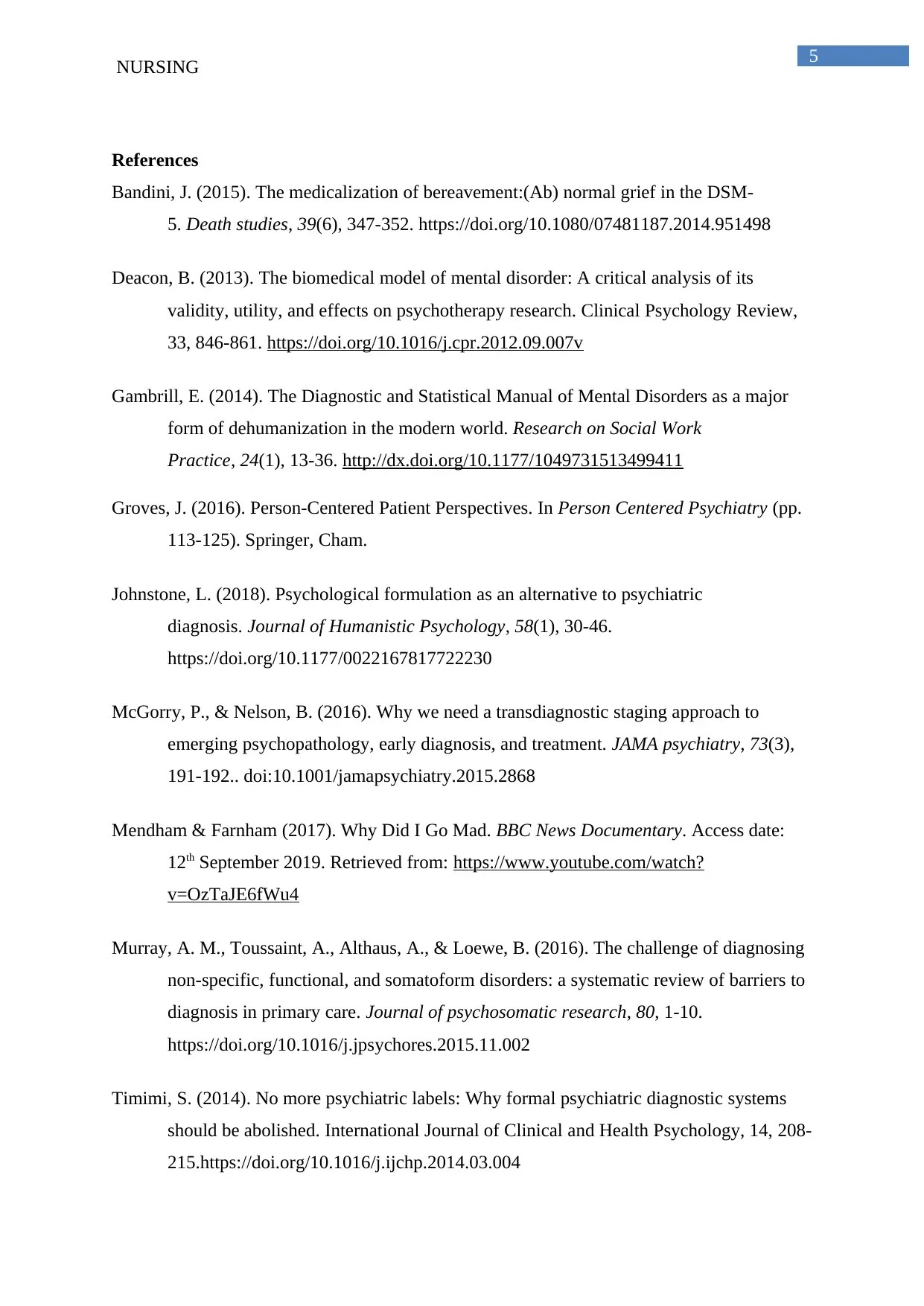
5
NURSING
References
Bandini, J. (2015). The medicalization of bereavement:(Ab) normal grief in the DSM-
5. Death studies, 39(6), 347-352. https://doi.org/10.1080/07481187.2014.951498
Deacon, B. (2013). The biomedical model of mental disorder: A critical analysis of its
validity, utility, and effects on psychotherapy research. Clinical Psychology Review,
33, 846-861. https://doi.org/10.1016/j.cpr.2012.09.007v
Gambrill, E. (2014). The Diagnostic and Statistical Manual of Mental Disorders as a major
form of dehumanization in the modern world. Research on Social Work
Practice, 24(1), 13-36. http://dx.doi.org/10.1177/1049731513499411
Groves, J. (2016). Person-Centered Patient Perspectives. In Person Centered Psychiatry (pp.
113-125). Springer, Cham.
Johnstone, L. (2018). Psychological formulation as an alternative to psychiatric
diagnosis. Journal of Humanistic Psychology, 58(1), 30-46.
https://doi.org/10.1177/0022167817722230
McGorry, P., & Nelson, B. (2016). Why we need a transdiagnostic staging approach to
emerging psychopathology, early diagnosis, and treatment. JAMA psychiatry, 73(3),
191-192.. doi:10.1001/jamapsychiatry.2015.2868
Mendham & Farnham (2017). Why Did I Go Mad. BBC News Documentary. Access date:
12th September 2019. Retrieved from: https://www.youtube.com/watch?
v=OzTaJE6fWu4
Murray, A. M., Toussaint, A., Althaus, A., & Loewe, B. (2016). The challenge of diagnosing
non-specific, functional, and somatoform disorders: a systematic review of barriers to
diagnosis in primary care. Journal of psychosomatic research, 80, 1-10.
https://doi.org/10.1016/j.jpsychores.2015.11.002
Timimi, S. (2014). No more psychiatric labels: Why formal psychiatric diagnostic systems
should be abolished. International Journal of Clinical and Health Psychology, 14, 208-
215.https://doi.org/10.1016/j.ijchp.2014.03.004
NURSING
References
Bandini, J. (2015). The medicalization of bereavement:(Ab) normal grief in the DSM-
5. Death studies, 39(6), 347-352. https://doi.org/10.1080/07481187.2014.951498
Deacon, B. (2013). The biomedical model of mental disorder: A critical analysis of its
validity, utility, and effects on psychotherapy research. Clinical Psychology Review,
33, 846-861. https://doi.org/10.1016/j.cpr.2012.09.007v
Gambrill, E. (2014). The Diagnostic and Statistical Manual of Mental Disorders as a major
form of dehumanization in the modern world. Research on Social Work
Practice, 24(1), 13-36. http://dx.doi.org/10.1177/1049731513499411
Groves, J. (2016). Person-Centered Patient Perspectives. In Person Centered Psychiatry (pp.
113-125). Springer, Cham.
Johnstone, L. (2018). Psychological formulation as an alternative to psychiatric
diagnosis. Journal of Humanistic Psychology, 58(1), 30-46.
https://doi.org/10.1177/0022167817722230
McGorry, P., & Nelson, B. (2016). Why we need a transdiagnostic staging approach to
emerging psychopathology, early diagnosis, and treatment. JAMA psychiatry, 73(3),
191-192.. doi:10.1001/jamapsychiatry.2015.2868
Mendham & Farnham (2017). Why Did I Go Mad. BBC News Documentary. Access date:
12th September 2019. Retrieved from: https://www.youtube.com/watch?
v=OzTaJE6fWu4
Murray, A. M., Toussaint, A., Althaus, A., & Loewe, B. (2016). The challenge of diagnosing
non-specific, functional, and somatoform disorders: a systematic review of barriers to
diagnosis in primary care. Journal of psychosomatic research, 80, 1-10.
https://doi.org/10.1016/j.jpsychores.2015.11.002
Timimi, S. (2014). No more psychiatric labels: Why formal psychiatric diagnostic systems
should be abolished. International Journal of Clinical and Health Psychology, 14, 208-
215.https://doi.org/10.1016/j.ijchp.2014.03.004
⊘ This is a preview!⊘
Do you want full access?
Subscribe today to unlock all pages.

Trusted by 1+ million students worldwide
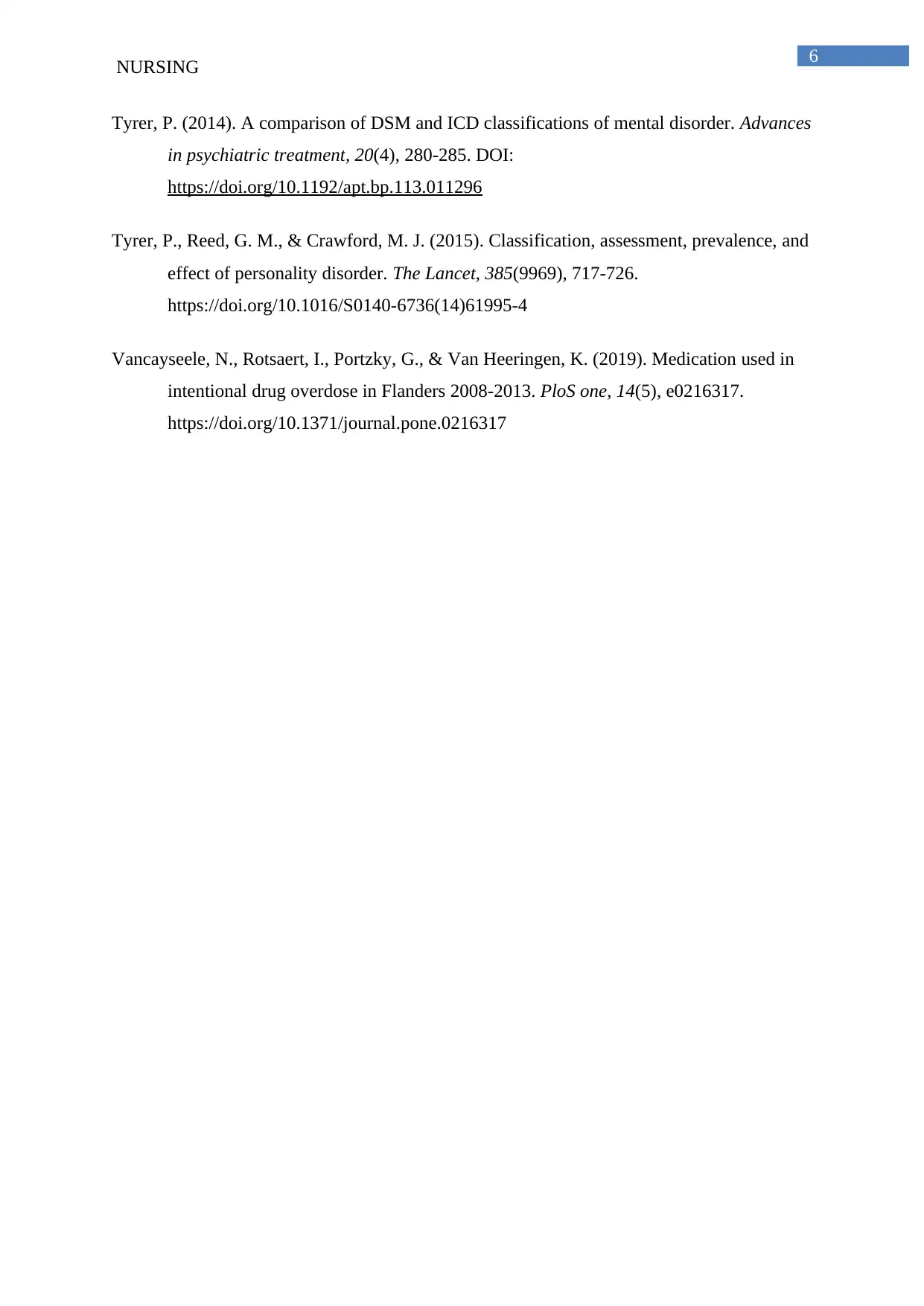
6
NURSING
Tyrer, P. (2014). A comparison of DSM and ICD classifications of mental disorder. Advances
in psychiatric treatment, 20(4), 280-285. DOI:
https://doi.org/10.1192/apt.bp.113.011296
Tyrer, P., Reed, G. M., & Crawford, M. J. (2015). Classification, assessment, prevalence, and
effect of personality disorder. The Lancet, 385(9969), 717-726.
https://doi.org/10.1016/S0140-6736(14)61995-4
Vancayseele, N., Rotsaert, I., Portzky, G., & Van Heeringen, K. (2019). Medication used in
intentional drug overdose in Flanders 2008-2013. PloS one, 14(5), e0216317.
https://doi.org/10.1371/journal.pone.0216317
NURSING
Tyrer, P. (2014). A comparison of DSM and ICD classifications of mental disorder. Advances
in psychiatric treatment, 20(4), 280-285. DOI:
https://doi.org/10.1192/apt.bp.113.011296
Tyrer, P., Reed, G. M., & Crawford, M. J. (2015). Classification, assessment, prevalence, and
effect of personality disorder. The Lancet, 385(9969), 717-726.
https://doi.org/10.1016/S0140-6736(14)61995-4
Vancayseele, N., Rotsaert, I., Portzky, G., & Van Heeringen, K. (2019). Medication used in
intentional drug overdose in Flanders 2008-2013. PloS one, 14(5), e0216317.
https://doi.org/10.1371/journal.pone.0216317
1 out of 7
Related Documents
Your All-in-One AI-Powered Toolkit for Academic Success.
+13062052269
info@desklib.com
Available 24*7 on WhatsApp / Email
![[object Object]](/_next/static/media/star-bottom.7253800d.svg)
Unlock your academic potential
Copyright © 2020–2026 A2Z Services. All Rights Reserved. Developed and managed by ZUCOL.





